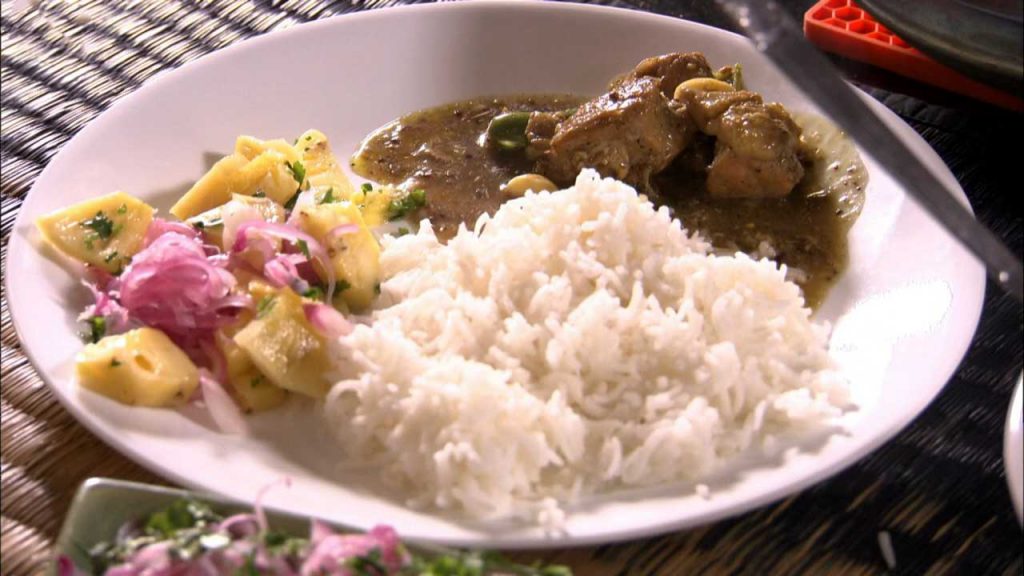Rick Stein’s India episode 3: Rick Stein arrives in the southern town of Madurai in Tamil Nadu – the land of temples. Here, he learns the art of temple cooking and perfects the knack of eating with his hands. He samples the famous south Indian sambar before taking a road trip across the spice-laden Western Ghats to the land of coconuts, Kerala. For lovers of fish, the Keralan backwaters are the ultimate paradise and its coastline is vital to the history of the spice route. Rick cooks south India’s favourite dessert, payasam, and a traditional Keralan pork curry.
Exploring the eating habits of these cities is the start of a fascinating trip for Rick who is inspired to cook dishes like prawns in coconut milk and his mum’s version of British Raj curry. Rick Stein sets out on a journey around India to discover the different cuisines celebrated the world over.
Rick Stein’s India episode 3
Sambar
This easy sambar is packed with vegetables and topped with a ‘tarka’ of fried onions with spices. Sambar is vegan and gluten-free, and is traditionally served over rice or with dosas or idlis in Tamil Nadu.
Method:
- For the vegetables, pour 1.5 litres/2½ pints of water into a large, deep pan and bring to the boil. Add the tur dal, onion, carrots, pumpkin, green beans and tomato and lower the heat to medium-low. Simmer uncovered for 30 minutes. Stir in the turmeric, sugar and salt and simmer gently for a further 15 minutes, or until the dal is soft.
- For the masala, heat the vegetable oil in a frying pan over a medium heat. Once hot, add the rest of the masala ingredients and fry for 30 seconds to one minute, or until fragrant. Tip them into a spice grinder or mini food processor, along with the oil, and blend to a paste. Stir the paste into the pan of vegetables.
- For the tarka, heat the oil in a clean frying pan over a medium heat and fry the tarka ingredients for 10 minutes, or until the onion is softened and golden-brown. Stir this into the pan with the vegetables, along with any oil, and serve.
Sweet milk pudding with vermicelli (payasam) – Rick Stein’s India episode 3
This is a very typical Tamil dessert; it will always be served at a Tamil wedding. A wedding that doesn’t serve payasam is not a real wedding, according to the locals. It’s slowly cooked milk reduced to the thickness of double cream and set with vermicelli and cardamom, decorated with pistachios, cashews and sultanas.
Method:
- Pour the milk into a large, deep-sided pan or karahi and place over a medium-high heat until it comes to the boil, then reduce the heat slightly and simmer for about 20 minutes until reduced in volume by a third.
- Meanwhile, heat the ghee (or butter) in a pan over a medium heat, add the vermicelli and fry for 1–2 minutes, or until lightly toasted but not browned.
- Once the milk has reduced, add the toasted vermicelli to the milk and simmer for a further 20 minutes, or until the vermicelli is soft and the milk reduced further.
- Stir in the sugar and cardamom, leave to cool slightly then pour into a serving dish, individual bowls or glasses.
- To decorate, heat the ghee (or butter) in a pan over a medium heat, add the cashew nuts and pistachio nuts and fry for 2-3 minutes, or until golden-brown, then stir in the sultanas. Spoon this decoration over the payasam, leave to cool, then transfer to the fridge to chill – overnight is best. Serve in small portions.
Pork curry with green chillies and tamarind
This is a Christian pork dish from Kerala, which to me is typical of the cookery of southern India in that, even though it’s a meat dish, it’s still light, fresh and acidic. The fattiness of pork is cut through by finishing the dish with a tamarind paste, sliced green chillies and garlic, and it’s normal to serve a sliced, pickled onion salad with it as well.
Method:
- Put the shallots, garlic, ginger and chillies into a mini food processor with a splash of water and blend to a rough paste.
- Fry the mustard seeds, cumin, cloves, cinnamon stick and peppercorns in a dry frying pan over a medium heat for a minute until toasted and aromatic. Add the turmeric and fry for another 20 seconds. Cool, then grind to a coarse powder.
- Heat the oil in a heavy-based pan or karahi over a medium-high heat. Add the pork, in batches if necessary to avoid overcrowding, and fry for 10 minutes, stirring occasionally, until browned.
- With all the pork in the pan, add the shallot, garlic, ginger and chilli paste, the ground spices and salt, and fry for a further five minutes, adding a splash of water if the paste starts to stick. Pour over enough water to just cover, turn the heat down to low, put a lid on and simmer for about 30 minutes, or until the meat is tender.
- To finish, fry the coriander seeds in a dry frying pan over a medium heat for a minute, or until toasted, then grind to a powder. Add the tamarind liquid, green chillies and garlic to the pork and cook for a further minute, then stir in the ground coriander. Serve.
